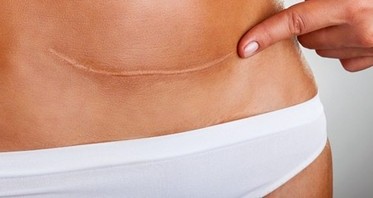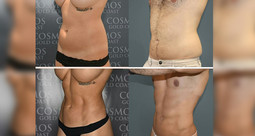Nutrition plays a crucial role in preventing scarring from surgical procedures. Certain foods contain nutrients that can improve wound healing and strengthen your tissue, while other foods can impede your skin’s repair process, increase the risk of infection and prolong your recovery. If you’re following a fad diet or you live on junk food, it’s time to get serious about your nutrition as these diets contain many foods best avoided during the healing process.
Wound healing is a complex process that can be divided into three main phases; inflammatory, proliferative, and maturation. To understand your body’s nutritional needs it helps to have a basic understanding of these phases:
Inflammatory
During the inflammatory phase, damaged cells, microbes and other debris are removed from the wound area. Your body’s white blood cells, growth factors, nutrients and enzymes create the swelling, heat, pain and redness commonly associated with this phase. As your body begins the healing process it requires optimum nutrition to control bleeding, prevent infection and allow repair cells to move to the site.
Since stress hormones are created and your metabolism speeds up during this process (known as the catabolic phase), your body relies on its immune system and reserves of energy, protein, vitamins and minerals to reduce the risk of infection and support the body in its recovery.
Proliferative
During this stage, new connective tissue and microscopic blood vessels (known as granulation tissue) form on the surface of the wound. In order to be healthy and strong, your blood vessels require an adequate supply of nutrients and oxygen. Myofibroblasts cause contraction of cells to help ‘pull’ the wound together.
Maturation
During the maturation phase, collagen is remodelled as the deeper and topical wounds close fully and skin healing is completed. Cells used in the initial stages of repair are removed by the body. Temporary collagen laid down during the proliferative phase is replaced by new collagen that is organised in a denser, tidier way which smooths and strengthens the wound and reduces the appearance of scars. The remodelling phase starts about three weeks after the surgery and can last for over a year.
Foods to avoid during wound healing post surgery
If your nutrition is inadequate, the phases in wound healing are impaired. The time it takes for the wound to heal increases and the scar formation will be compromised. Here are the key foods to avoid during your body’s wound care response following surgery:
1. Sugar
A diet high in sugar and refined carbohydrates may potentially influence the quality of collagen and elastin.
Collagen and elastin make up a fibrous network that provides your skin with structure, support and elasticity, playing a key role in all the phases of wound healing. By consuming large amounts of sugar you’re risking the degradation of collagen and elastin, increasing your chances of developing side-effects such as scar tissue (hypertrophic or keloid scars).
Watch out for hidden sugars in processed foods and if you’re tempted to replace sugar with artificial sweeteners to lose weight, read this article first.
2. Nitrate-Rich Foods
The health of blood vessels reaching the site of the wound is vital in the healing process as these deliver the nutrients and oxygen required for repair. Excess nitrates in your diet can damage these blood vessels, impairing the wound healing process.
Natural nitrates contained in foods such as vegetable have many health benefits. Nitrates found in processed meats, however, such as bacon, salami and hot dogs (commonly used as preservatives) can be dangerous to your health.
Excessive consumption of certain nitrate-rich foods, particularly those found in processed meats, might have an impact on overall health. This can lead to obstruction in blood flow, reducing your body’s ability to reduce scars and boost collagen production. This can also lead to stroke, heart attack and bleeding disorders.
3. Alcohol
Alcohol directly affects the absorption of nutrients required to repair your skin following a surgical wound. It does this by damaging the cells that line the stomach and intestines so these nutrients cannot be transported through the blood to the site of your wound.
Excessive alcohol consumption may affect the body’s nutrient absorption processes. Collagen is vital in each phase of wound healing as deficiency can slow healing time, worsen the appearance of scars and impact your overall well-being.
Vitamins A, C, D, Vitamin E, K and the B vitamins are vital for skin healing and cell maintenance. Alcohol also inhibits the absorption of these essential vitamins.
Alcohol also decreases the body’s ability to absorb minerals, zinc in particular, which is vital in collagen synthesis during the early granulation tissue. Therefore zinc deficiency can delay wound healing post surgery.
4. Caffeine
Caffeine is on the list of foods to avoid during wound healing. While caffeine is known for its strong antioxidant properties, it has the potential to hinder your skin’s natural healing process. Excessive caffeine intake can not only affect nutrient absorption, but it can also compromise your skin’s integrity by siphoning hydration from your body. Dehydration causes the skin to become more fragile and susceptible to breaking down.
It also can limit the supply of nutrients and oxygen to the wound by reducing blood volume due to lack of hydration. This can cause tissue perfusion where the tissues at the capillary level are undernourished. Cellular proliferation, adhesion and migration are restricted, thus increasing wound healing time.
Foods You Should Eat to Improve Wound Healing and Scar Formation
Scars can be a great source of emotional anguish. While scar formation will differ from patient to patient, ensuring you nourish your body with all the right nutrients will improve your wound healing and help promote overall health too.
For your scars to heal well after surgery, they’ll require these nutrients:
· Protein
You’ll want to increase your protein intake after surgery to aid the healing process. Protein is broken down into amino acids L-Arginine and Glutamine, both of which are very important for wound repair. These amino acids help to form collagen, vital for the strength of your skin.
Sources of glutamine include: protein-rich foods like beef, chicken, fish, eggs, vegetables like beans, beetroot, cabbage, spinach, kale, carrots, parsley, Brussel sprouts, celery, papaya and fermented foods like miso.
Sources of L-Arginine include: soybeans, peanuts, pumpkin seeds, spirulina, chicken.
· B vitamins
B vitamins are essential to speed up the healing of wounds by increasing protein synthesis and enabling more repair cells to the site. B1 and B5 are particularly important for promoting skin health by strengthening scar tissue and increasing the number of fibroblasts that help secrete collagen. You can find B-vitamins in foods such as eggs, poultry, fish, green vegetables and legumes, almonds, avocado, lentils, sunflower seeds, cantaloupe, tomatoes, peanuts, sweet potato, mushrooms, whole grains, peas, quinoa, sesame seeds, soybeans, and watermelon.
· Vitamin C
Vitamin C is one of the most important antioxidants for wound healing as it improves wound strength and aids the production of collagen. It is also vital for the development of new blood vessels that helps to transport nutrients to the wound. You’ll find vitamin C in leafy green vegetables and citrus fruits.
· Vitamin A
Vitamin A is another vital antioxidant for skin health post-surgery. This vitamin aids in the inflammatory response and can help prevent infection of the wound. As your wound is healing and the scar is forming, vitamin A is crucial for stimulating the growth of new blood vessels and the production of connective tissue. Dark leafy green vegetables, fish and eggs are all great sources of vitamin A. Supplementation of vitamin A should be met with caution as toxicity can occur.
· Zinc
One of the most important minerals you can consume to improve scar formation is zinc. Zinc aids in the synthesis of protein and the development of collagen. Zinc has the potential to reduce your healing time from surgery by up to 43 percent. Deficiencies in this important trace mineral have been associated with delayed or slowed healing, and reduced wound strength. Great sources of zinc include meat, fish, poultry and eggs, beans and legumes, tofu, nuts, seeds and oats.
Optimise your nutrition to speed up wound healing
An effective way to speed up your healing processes after surgery is with Intravenous Vitamins, a treatment that gives you a powerful boost of vitamins directly into your bloodstream.
It is important to eat a balanced diet and stay on top of your nutrition long term as the final phase of repair can last for over a year. If you are unhappy with the appearance of scars once the full healing process has finished it’s worth noting that scarring can be minimised with a ProFractional Laser or Collagen Induction Therapy (CIT) to stimulate collagen production.
You don’t have to get it 100% perfect all the time and it’s important to be sensible about your nutrition,
Good nutrition is the most important measure you can take to minimise scarring post-surgery. Even if you only have minimal liposuction wounds, it’s worth taking your doctor’s medical advice seriously and ensuring you eat an adequate amount of the beneficial foods while reducing your intake of those foods that can impede wound healing. This will accelerate the repair process and ensure you achieve better results.
Related posts






